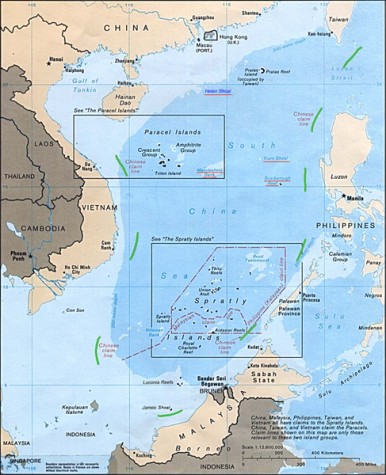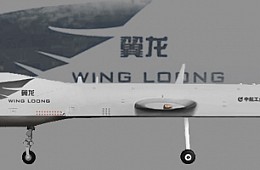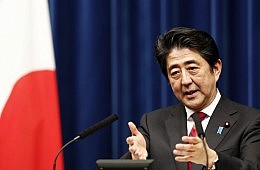
Image Credit: Wikimedia Commons
Vietnam, China Clash Over Oil Rig in South China Sea
5
5
0
0
10 Shares
0 comments
Even while tensions continue between China and the Philippines, a new flashpoint has emerged in the South China Sea. On May 5, China’s Maritime Safety Administration announced that a drilling rig owned by the China National Offshore Oil Corporation (CNOOC) would be set up near the Paracel Islands (called Xisha by the Chinese). The announcement said the drill would be in operation for the next three months.
Vietnam has vocally denounced the move. The Ministry of Foreign Affairs says that the drilling rig, located 120 nautical miles from the Vietnamese coast, is located within their exclusive economic zone. According to the ministry, Vietnamese Deputy Prime Minister and Foreign Minister Pham Binh Minh called Chinese State Councilor Yang Jiechi to criticize the drilling operation. Minh denounced the presence of China’s drilling rig and “a large number of vessels” as illegal and a serious violation of Vietnamese sovereignty, as well as control over its EEZ. Vietnam “cannot accept but resolutely opposes China’s act, and demands that it completely withdraw the drilling rig and escort vessels,” Minh said.
China seems to be taking a page from Japan’s book on dealing with a territorial dispute by ignoring the other party’s claims. Xinhua reported that Yang Jiechi told Pham Binh Minh there was no dispute over the islands. Instead, Yang denounced “the Vietnamese harassment of Chinese companies’ normal activities” near the Paracels. China’s Foreign Ministry had similar comments, with spokesperson Hua Chunying telling the pressthe “relevant drilling work is totally within waters off China’s Xisha islands.”
On Wednesday, the situation appeared even more grim as Vietnam’s Ministry of Foreign Affairs said that a Chinese vessel had purposefully rammed two Vietnamese ships near the drilling rig. Six people were injured and the ships were seriously damaged, the ministry said. Reuters quoted one official as saying that “Chinese ships, with air support, sought to intimidate Vietnamese vessels. Water cannon was used.” Territorial tensions between China and Vietnam had subsided in recent years. Now, the presence of the drilling rig, and the reported clash between Vietnamese and Chinese ships, has the two countries positioned for a long diplomatic battle.
In its original note to the Chinese Foreign Ministry, Vietnam stressed that it “holds its friendship, cooperation and comprehensive strategic cooperative partnership with China in high esteem.” On that note, Vietnam expressed its willingness to engage in bilateral negotiations (China’s preferred method for resolving disputes) over the issue. On Wednesday, however, a Vietnamese official said that Hanoi was not excluding any peaceful measures, “including international legal action.” The Philippines filed an international arbitration claim against China in March, despite Beijing’s strong protests. Vietnam made it clear that it would consider a similar move should China continue to refuse to acknowledge Hanoi’s complaints.
Given the diplomatic consequences, why has China decided to proceed with the drilling? Wu Shicun, the president of China’s National Institute for South China Sea Studies, interpreted the move as a test of China’s political will. “If we stop our work there as soon as Vietnam shouts, China will not be able to achieve anything in the South China Sea,” Wu told Reuters, noting that China has already “lost a precious opportunity to drill for oil and gas in the Spratlys.”
Reuters also spoke with an oil industry official who hinted that China’s drilling rig was entirely a political move. “This reflected the will of the central government and is also related to the U.S. strategy on Asia,” the official said. “It is not commercially driven.” In other words, the drilling rig is a political statement of China’s resolve to control the areas it claims as its territory within the South China Sea — and that message is meant for Washington as much as for Hanoi and Manila.
The U.S. has already addressed to the situation, with a State Department spokesperson calling China’s move “provocative.” “Given the recent history of tensions in the South China Sea, China’s decision to operate its oil rig in disputed waters is provocative and unhelpful to the maintenance of peace and stability in the region,” thespokesperson said.
China’s Foreign Ministry, in response, said that “the activities of the Chinese companies in the Xisha Islands are within the mandate of China’s sovereignty and administration, which have nothing to do with Vietnam and the U.S.”
If, as Reuters reported, the drilling operation is meant largely as a political message, its implications are clear — China intends to exploit the resources within its nine-dash line without regard for protests from other claimants or the U.S. Beijing is even prepared to resort to low-level force (ramming boats and firing water cannons) to protect its claims.
Facebook5
Twitter5
Google+0
LinkedIn0
RELATED STORIES
LATEST BLOGS
COMMENTS
NEWSLETTER
Sign up for our weekly newsletter
The Diplomat Brief
POPULAR STORIES
- TOPICS
- Blogs
- Diplomacy
- Economy
- Environment
- Features
- Interviews
- Photo Essays
- Podcasts
- Politics
- Security
- Society
- Videos
- BLOGS
- James Holmes
- China Power
- Flashpoints
- Zachary Keck
- ASEAN Beat
- The Pulse
- Pacific Money
- Asia Life
- The Editor
- ARCHIVES
- Sport & Culture
- Indian Decade
- A New Japan
- New Leaders Forum
- New Emissary
- Tokyo Notes
- APAC Insider
- Asia Scope
- China, What's Next?
- Tech Biz
- THE DIPLOMAT
- About Us
- Partners
- Advertise
- Syndication
- Privacy Policy
- Contact Us
© 2014 The Diplomat. All Rights Reserved.








No comments:
Post a Comment